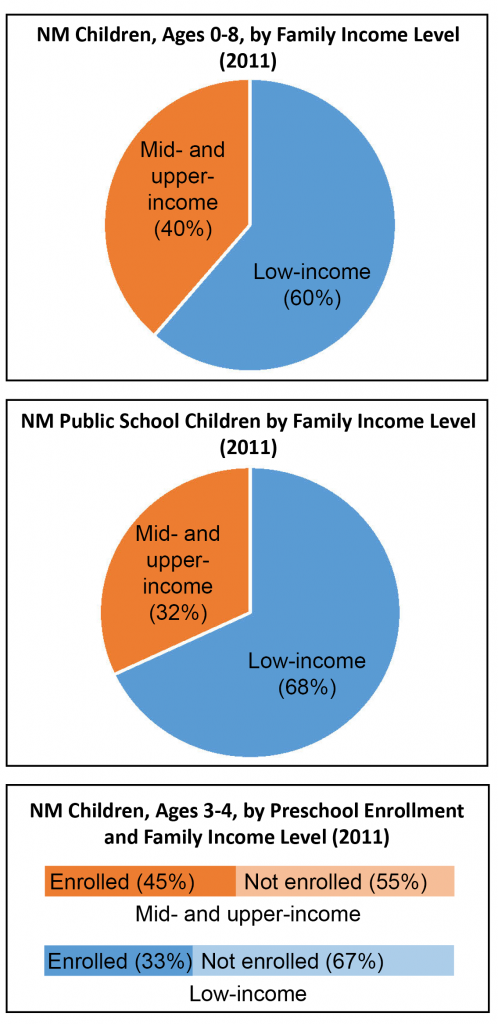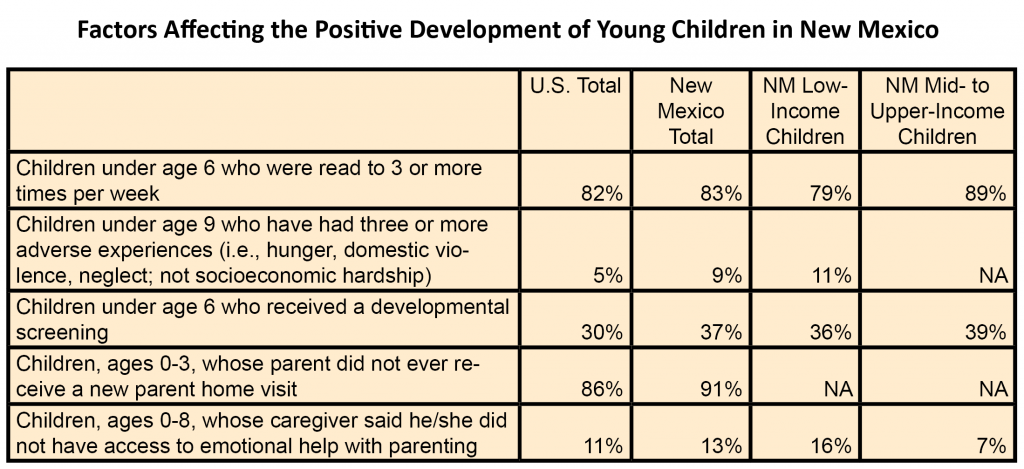What We Must Address in New Mexico to Get It Right
Released in conjunction with the Annie E. Casey Foundation’s The First Eight Years report
Download this fact sheet (Nov. 2013; 2 pages; pdf)

Every child deserves equal access to opportunities that help them succeed in school and in life. Children born to low-income families have less access to these opportunities, which are especially important very early in life.
Sadly, the majority of New Mexico’s children, live in low-income* families.
Children are born ready to learn, but their situation—their family’s economic security, physical and mental health, parents’ education, and the presence or lack of community resources—has a major impact on their growth and development.
Critical brain building takes place during the first five years of life. This brain architecture requires appropriate stimulation in order to produce healthy cognitive, social, and emotional growth that will be the basis for later success in school.
Young children who live in low-income families face greater barriers to healthy development, and often end up falling behind in cognitive, social, and emotional milestones.
High-quality early childhood care and learning programs can provide children with the opportunities they need for healthy brain development.
In New Mexico only 38 percent of all 3- to 4-year-olds attend some form of preschool (not all high-quality). Even fewer low-income children are enrolled.
New Mexico’s low-income families face the same challenges as higher-income families in raising their children, but with fewer resources and support. These parents often work more than one job, at odd hours, and for low wages and few benefits. They often live in inadequate housing, struggle to apply for supports like Medicaid for their children, and don’t get paid leave to care for a sick child. Many of these parents struggle to find the time, money or strength needed to fully nurture their children.
Parents’ stress can be passed on to their children. For example, research shows that children of depressed mothers are more likely to have depression or other emotional/behavioral disorders themselves. New Mexico has a very high rate (from 11 to 20 percent) of maternal postpartum depression. The following are other factors that contribute to the positive or negative well-being of children.
Policy Changes to Help New Mexico’s Vulnerable Children
No single program, policy or approach can provide low-income children the resources and support essential for healthy development. A holistic approach is required that addresses the needs of both children and their parents, especially when children are very young. Integrated policies that address health, education, and economic supports can be implemented in New Mexico. In particular, the following are key:
- Build a high-quality, comprehensive early childhood care and education system that transitions children into grades K-12 and is accessible to all young children, especially those in low-income families. Building this system is a long-term process, and policymakers should find a sustainable, adequate source of funding.
- Restore eligibility for child care assistance to twice the poverty level and increase funding in order to improve quality. Currently, eligibility for child care assistance is at 125 percent of the poverty level, and some 5,000 children are on the waiting list.
- Protect, increase, or improve funding and access for low-income families to supports like Medicaid, SNAP (Supplemental Nutrition Assistance Program), the Low Income Energy Assistance Program, the Working Families Tax Credit, Individual Development Accounts, unemployment benefits, and others. These supports supplement families’ income and free up money for other child necessities.
*Low income includes those living at or below 200 percent of the federal poverty level. 200 percent of FPL is $39,060 for a family of three.
KIDS COUNT is a program of the Annie E. Casey Foundation.

